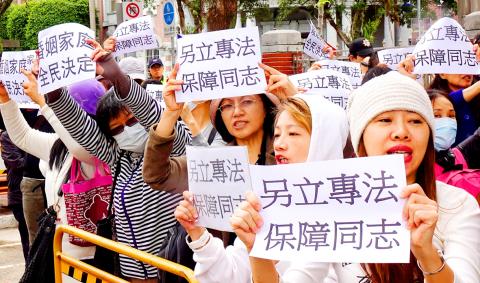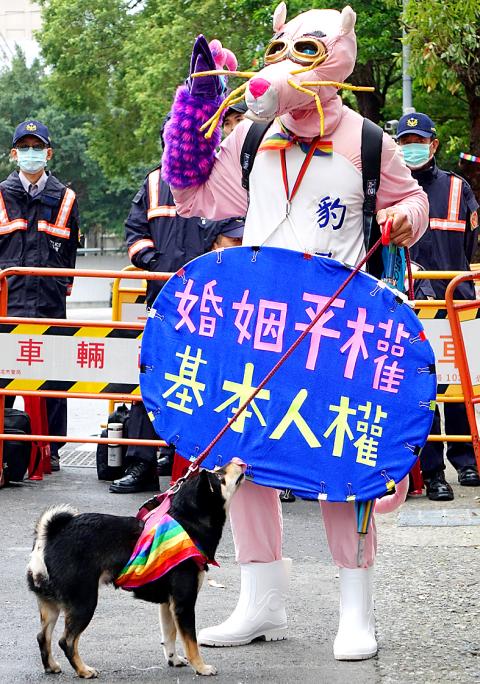Supporters and opponents of same-sex marriage presented their viewpoints at a mostly peaceful public hearing at the legislature in Taipei yesterday, with recommendations for and against amending the Civil Code or drafting a separate bill specifically to protect the rights of homosexuals and same-sex couples wishing to marry or adopt children.
While the debate continued at the hearing held by the legislature’s Judiciary and Organic Laws and Statutes Committee, a coalition of religious and conservative organizations held a rally opposing same-sex marriage at the front gate, while lesbian, gay, bisexual and transgender (LGBT) groups and campaigners organized activities in support of their cause at the side entrance on Jinan Road.
It was the first of two mandated public hearings on the issue after Chinese Nationalist Party (KMT) legislators managed to stall proceedings at last week’s committee meeting to review the various amendments.

Photo: Chu Pei-hsiung, Taipei Times
At that time, a protest against same-sex marriage attended by about 20,000 people, organized by the Alliance of Taiwan Religious Groups for the Protection of Family, was held outside the legislature, with about 60 protesters storming the compound in the afternoon.
At yesterday’s hearing, Yen Cheng-fang (顏正芳), a psychiatrist specializing in children’s issues, said homosexuals should have the equal rights as the rest of society to enter into a marriage, form a family and raise children.
“LGBT persons will not cause unhealthy development in children, the problem is social discrimination. My studies indicate children raised by same-sex couples are just as healthy in their mental and personal development as those raised by heterosexual couples,” Yen said.

Photo: Chu Pei-hsiung, Taipei Times
Kaohsiung Presbyterian minister Tsai Wei-en (蔡維恩) said that most Presbyterian churches and their congregations are opposed to the legalization of same-sex marriage.
“We represent the silent majority of Taiwanese. There are many people who are against [same-sex marriage], but were not given opportunity to express their opinion,” Tsai said.
Tsai said he has empathy for homosexuals and their plight, “but to legalize their marriage and other rights, it is in reality an oppression as it deprives the rights of a majority of people.”
Former New Party legislator Hsieh Chi-ta (謝啟大) said she is opposed to legalizing same-sex marriage as the issue has created much conflict and division in society.
“Marriage is not a legal right granted by the government, it is a social institution to have a family for propagating the next generation,” Hsieh said.
“The bill is not necessary, because Taiwanese do not discriminate, we are a very tolerant society ... even someone with Asperger syndrome can be elected mayor,” she said, referring to Taipei Mayor Ko Wen-je (柯文哲).
“If I see a cockroach, it does not mean there is only one, but that there are hundreds of cockroaches behind it,” she said, accusing the Ministry of Justice of failing to conduct in-depth analysis and take into consideration the “domino effect” when it studied same-sex marriage issues in other nations.
She cited an Academia Sinica study that said that only 0.2 percent of the population profess to being homosexual, while 1.9 percent identify as bisexual.
“How can we allow a minority to dictate policies for the vast majority of people. If the bill passes, it will destroy the fundamental structure of society,” she said.
Gay rights activist Chen Chih-ming (陳志明) called for the nation to be more progressive and to entrench LGBT rights as has been done in other advanced nations.
“We are just asking the nation to protect and guarantee our equal rights as citizens without discrimination. We also want to have a loving spouse, but cannot do so under the current law,” Chen said.
Some participants said it would be better to draft a separate bill specifically to protect the rights of homosexuals and same-sex couples rather than amending the Civil Code.

Several Chinese Nationalist Party (KMT) officials including Chairman Eric Chu (朱立倫) are to be summoned for questioning and then transferred to prosecutors for holding an illegal assembly in Taipei last night, the Taipei Police said today. Chu and two others hosted an illegal assembly and are to be requested to explain their actions, the Taipei City Police Department's Zhongzheng (中正) First Precinct said, referring to a protest held after Huang Lu Chin-ju (黃呂錦茹), KMT Taipei's chapter director, and several other KMT staffers were questioned for alleged signature forgery in recall petitions against Democratic Progressive Party (DPP) legislators. Taipei prosecutors had filed

Taiwan would welcome the return of Honduras as a diplomatic ally if its next president decides to make such a move, Minister of Foreign Affairs Lin Chia-lung (林佳龍) said yesterday. “Of course, we would welcome Honduras if they want to restore diplomatic ties with Taiwan after their elections,” Lin said at a meeting of the legislature’s Foreign Affairs and National Defense Committee, when asked to comment on statements made by two of the three Honduran presidential candidates during the presidential campaign in the Central American country. Taiwan is paying close attention to the region as a whole in the wake of a

President William Lai (賴清德) has appointed former vice president Chen Chien-jen (陳建仁) to attend the late Pope Francis’ funeral at the Vatican City on Saturday on his behalf, the Ministry of Foreign Affairs said today. The Holy See announced Francis’ funeral would take place on Saturday at 10am in St Peter’s Square. The ministry expressed condolences over Francis’ passing and said that Chen would represent Taiwan at the funeral and offer condolences in person. Taiwan and the Vatican have a long-standing and close diplomatic relationship, the ministry said. Both sides agreed to have Chen represent Taiwan at the funeral, given his Catholic identity and

NEW WORLD: Taiwan is pursuing innovative approaches to international relations through economics, trade and values-based diplomacy, the foreign minister said Taiwan would implement a “three-chain strategy” that promotes democratic values in response to US tariffs, Minister of Foreign Affairs Lin Chia-lung (林佳龍) said. Taiwan would aim to create a “global democratic value chain,” seek to capitalize on its position within the first island chain and promote a “non-red supply chain,” Lin was quoted as saying in the ministry’s written report to the Legislative Yuan submitted ahead of the legislature’s Foreign Affairs and National Defense Committee meeting slated for today. The Ministry would also uphold a spirit of mutual beneficial collaboration, maintaining close communication and consultations with Washington to show that Taiwan-US cooperation